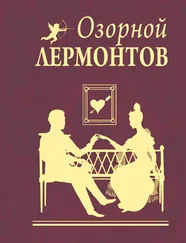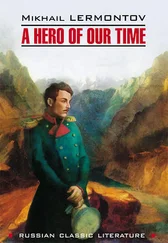But to dismiss Lermontov as a romantic poseur in melodramatic episodes is unfair, and his biographer Laurence Kelly writes that the young writer “[I]n heart-searching letters… confessed to a melancholy that was more than a fashionably romantic pose. Behind the masque of social gaiety there was a young man still in his teens, perplexed and unsure, ‘unfit for society,’ ‘seeking impressions, any impressions,’ tortured by the secret consciousness that ‘I shall end life as a contemptible person…’” [8] Kelly, Laurence. Lermontov: Tragedy in the Caucasus, p. 44.
Until the mid-1830s, Lermontov’s poetry addresses his personal concerns—loneliness, love, the loss of his parents—but he would soon turn to larger themes, both social and political. After leaving cadet school, he lived in St. Petersburg for a few years, and in 1837 he wrote the poem “Death of a Poet,” which charged the imperial court with mistreating Pushkin and causing his death. It was then that he was arrested, demoted, and sent to the Caucasus to serve with Russian forces in their struggles against the mountain tribes.
“Death of a Poet” marks the start of a most productive period in Lermontov’s career as a writer. Between 1837 and 1840, while Lermontov alternated between stints in St. Petersburg and the Caucasus mountains, he wrote The Demon, The Novice, and A Hero of Our Time, as well as many poems. After his second Caucasian posting, he returned and asked for permission to leave the army to devote himself to his writing. He was denied. In 1841, he was sent again to the Caucasus, where he died in the duel with Martynov. Upon Lermontov’s death, Tsar Nicholas the First is purported to have reacted by saying: “a dog’s death for a dog.” Such were the times for this literary hero.
Translating Lermontov requires a linguistic zoom lens—while working closely one must regularly pull back to see a larger picture of words. The beauty of his work lies at the level of the sentence and the paragraph. Lermontov is not a writer whose words are so carefully chosen that the translator must agonize to get each syllable pitch-perfect. But faced with the task of translating A Hero of Our Time, I did so anyway, out of a sense of fidelity. I followed his every clause carefully, keen to avoid assumptions that can be so easily made in working with writing of a Romantic bent. But most of all, this close reading makes for magic in a translation—in focusing on the building blocks of a text, piling words on top of each other just so, something emerges, an essence that the translator hasn’t forced. As Maurice Baring wrote in 1914: “[W]hen you read Pushkin, you think: ‘How perfectly and how simply that is said! How in the world did he do it?’ You admire the ‘magic hand of chance.’ In reading Lermontov at his simplest and best, you do not think about the style at all, you simply respond to what is said, and the style escapes notice in its absolute appropriateness.”
Lermontov wasn’t a master stylist, he was a master story-teller. That’s not to say that the quality of the prose is lacking but that his writing is very fluent—not meant to be paused over for any great length of time. A reader needn’t look for surprising combinations of words. Lermontov’s language is constantly moving—a motion that becomes clear to a translator only upon achieving enough pace to feel the momentum of his writing. As Eikhenbaum wrote: “ A Hero of Our Time looks like the first ‘light’ book; a book in which formal problems are concealed beneath careful motivation and which, therefore, was able to create the illusion of ‘naturalness’ and to arouse an interest in pure reading.” [9] Eikhenbaum, B. M. Lermontov: A Study in Literary-Historical Evaluation, p. 170.
The naturalness to which he refers is a very true characterization of Lermontov’s writing—the author strived to avoid archaic turns of phrase, and easily captures the voices of the various personages. This is the translator’s challenge here: to preserve his nineteenth-century idiom but to avoid anything that seems obsolete to a contemporary reader; to capture the various voices in the novel without too many cultural contortions; to match his rhythms, from paragraph to paragraph; and, above all, to disappear so that the reader may swiftly move through the book and its mountain story. Yes, he tends to repeat words and phrases in this book, and yes, he seems to have a very simplistic palette when it comes to describing colors, and yes, the sun appears from behind cold, snowy, or dark-blue peaks many times over the course of the novel. But his is a feat of narrative, a romping story about a dislikable man who captures your whole attention with his manifold contradictions.
NATASHA RANDALL
I am particularly grateful to the following people and institutions for their invaluable support of this translation: Nikoloz Japaridze, Eugene Ostashevsky, Adrian Pascu-Tulbure, James Potts, Jane Tozer, and Donald Rayfield, with particular thanks to Katie Kotting, Gordon Wallace, and the Hawthornden Writer’s Retreat.
Suggestions for Further Reading
Barratt, Andrew, and A. D. P. Briggs. A Wicked Irony: The Rhetoric of Lermontov’s A Hero of Our Time (Bristol Classics Press, Bristol, 1989).
Eikhenbaum, Boris. Lermontov: A Study in Literary-Historical Evaluation (trans. Ray Parrott and Harry Weber, Ardis, Ann Arbor, 1981).
Freeborn, Richard. “ A Hero of Our Time ” in The Rise of the Russian Novel (Cambridge University Press, Cambridge, 1973).
Garrard, John G. Mikhail Lermontov (Twayne Publishers, Boston, 1982).
Gifford, Henry. The Hero of His Time; A Theme in Russian Literature (Edward Arnold and Co., London, 1950).
Gilroy, Marie. Lermontov’s Ironic Vision (Birmingham Slavonic Monographs No. 19, published by the Department of Russian Language and Literature, University of Birmingham, 1989).
Kelly, Laurence. Lermontov: Tragedy in the Caucasus (Constable and Company, London, 1977).
Lavrin, Janko. Lermontov (Bowes and Bowes, London, 1959).
Lermontov, Mikhail Yurievich. “The Demon” in Narrative Poems by Alexander Pushkin and by Mikhail Lermontov (trans. Charles Johnston, Random House, New York, 1983).
Lermontov, Mikhail Yurievich. “The Novice” in Narrative Poems by Alexander Pushkin and by Mikhail Lermontov (trans. Charles Johnston, Random House, New York, 1983).
Mersereau, John. Mikhail Lermontov (Southern Illinois University Press, Carbondale, 1962).
Reid, Robert. Lermontov’s A Hero of Our Time (Bristol Classical Press, Bristol, 1997).


A foreword is both the first and the last thing to a book: it serves either to explain the aims of the work, or to justify it and respond to its critics. But usually, the reader is not involved in moral purpose or journalistic offensives, and hence they don’t read forewords. This is a shame, especially for our country. Our audience is still so young and simple-hearted, it wouldn’t recognize a fable if there weren’t a moral at the end of the story. It doesn’t anticipate jokes, it doesn’t have a feel for irony; it is simply badly educated. It doesn’t yet know that overt abuse has neither a place in proper society, nor in a proper book; that the contemporary intellect has devised sharper weapons, almost invisible, but nonetheless deathly, which, under the clothing of flattery, deliver an irresistible and decisive blow. Our audience is like a provincial person, who overhears a conversation between two diplomats belonging to enemy sovereignties, and is left convinced that they are both betraying their governments for the sake of mutual, affectionate friendship.
Читать дальше
Конец ознакомительного отрывка
Купить книгу
![Михаил Лермонтов A Hero of Our Time [New Translation] обложка книги](/books/27671/mihail-lermontov-a-hero-of-our-time-new-translati-cover.webp)












